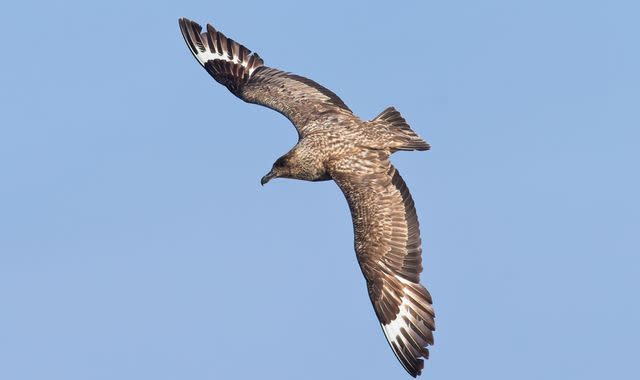Bird flu leads to 'catastrophic' fall in seabird numbers in UK, RSPB report says

Bird flu has caused a "catastrophic" fall in the number of seabirds in the UK, a study of breeding sites has found.
The great skua, known as the 'pirate of the seas' because it often steals food from other birds, fell by 76% from 9,088 to 2,160, according to 2023 research by the Royal Society for the Protection of Birds (RSPB).
Almost the entire UK population of great skuas live in Scotland. In 2022, more than 2,500 died, the study said.
Numbers of gannets and roseate terns were also seriously hit after the H5N1 strain of avian flu spread to wild birds in the summer of 2021, killing tens of thousands of them.
The populations of the three species had been rising before the outbreak.
Gannets were badly affected in 2022, with 11,175 killed in Scotland and around 5,000 in Wales.
The RSPB said: "From the new surveys carried out across the 2023 breeding season at selected sites the new study recorded devasting losses in gannets, great skuas and roseate terns.
"The three species saw declines of 25%, 76%, and 21% respectively, across 75%, 81%, and 98% of their UK population within a period of just 2-9 years."
Jean Duggan, RSPB avian influenza policy assistant, told The Guardian "that level of loss in a population we have international responsibility for is quite catastrophic. Globally, it's very significant and has a knock-on effect for populations across the globe."
The RSPB studied 13 bird species from May to July 2023, and concluded that nine showed declines of over 10% across the sites surveyed.
The fall in the number of great skuas, gannets and roseate terns was attributable to bird flu, while reductions in sandwich and common terns were most likely down to the disease, the report said.
The charity said the role of the infection in other species' declines "is less clear".
It found the number of sandwich terns fell by 35% and common terns by 42% compared with a major census of bird populations in 2015-2021.
Avian flu has become less acute in the UK in recent months, but it has caused mass mortalities of birds in other parts of the world.
Read more:
Species threatened with extinction named
10,000 seabirds dead or sick due to avian flu
Eight months of record-breaking heat continued in January
In January, it was detected in elephant and fur seals in Antarctica for the first time and has also been recorded among penguins in the Antarctic.
Bird flu has become one of the "biggest immediate conservation threats faced by multiple seabirds", across the UK and continental Europe, the report warned.
Climate change, mortality linked to fishing, the effects of offshore wind developments and a reduction in the availability of food are other threats facing UK seabirds, according to the RSPB.


